LUTHER AND PROTESTANT SUPPORT OF THE NAZI GOVERNMENT
"It is easy to see how Luther prepared
the way Hitler." - Dr. William Temple, Archbishop
of Canterbury
A Man like Hitler could have only have succeeded in country that was thoroughly
Protestant (or godless) or else he would have been put down and strongly
resisted (as was the case with Mussolini in Italy). This fact comes through as
we read that "the first electoral breakthroughs enjoyed by the Nazis came in
Protestant rural areas, such as Schleswig-Holstein and Lower Saxony,
...Subsequently the constituencies with the highest proportion of Nazi voters
were in Protestant farming communities; and by 1932 the stream of peasant
deserters to Hitler's party had become a torrent." (The "History Today"
Magazine, October 1998, from the article entitled "WHO VOTED FOR THE NAZIS?)
Peter F. Wiener
(a German author) in his work
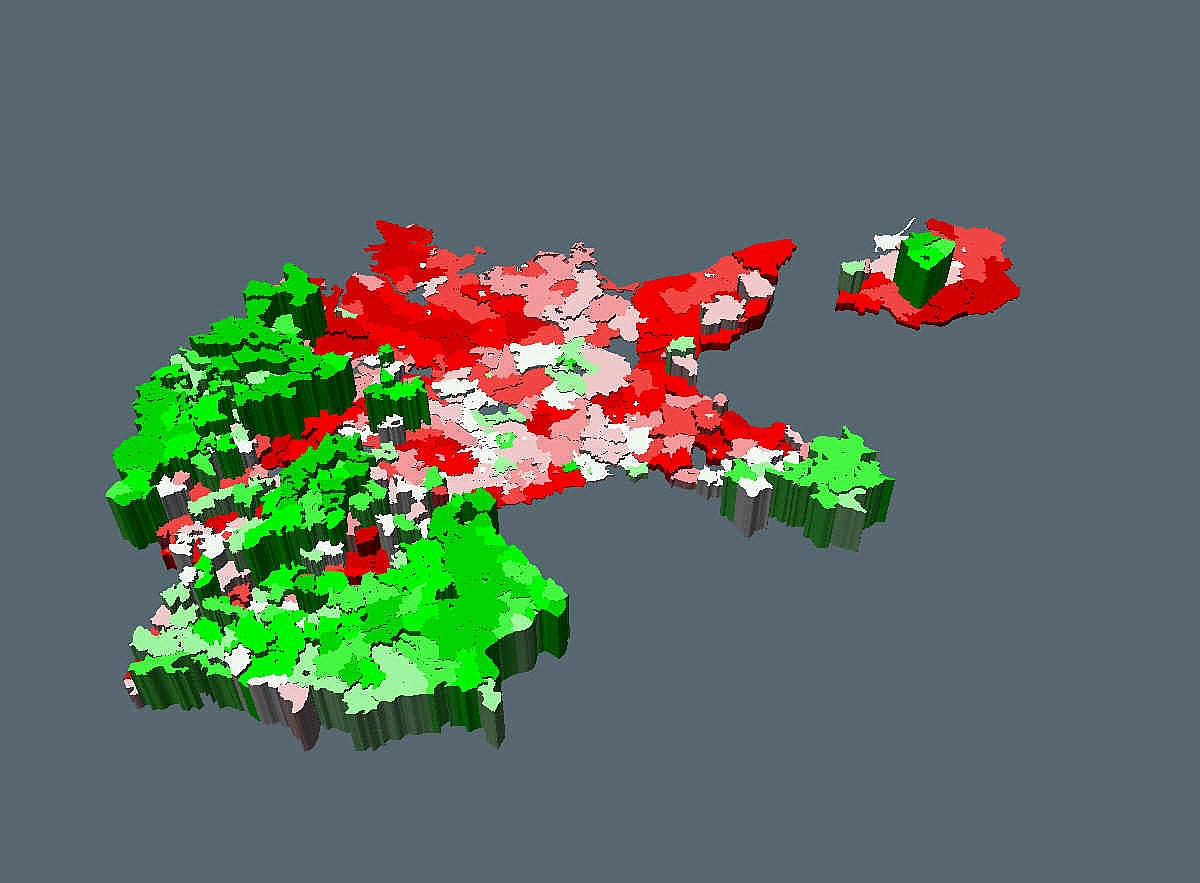 This
map shows the influence of religious conviction on the Nazi vote for the
Reichstag election 7/32. Elevation represents the share of Catholics /
protestants (the higher, the more Catholics live in a Kreis) in relation to
total population. The Nazi vote share is represented by different color
shadings (dark red: highest NSDAP share; light green: lowest NSDAP share). The
map reveals that the NSDAP strongholds are clearly restricted to protestant
areas. This becomes very clear e.g. in East Prussia, where in a small catholic
enclave the NSDAP performed very poorly in comparison to the surrounding Kreise
dominated by protestants.
This
map shows the influence of religious conviction on the Nazi vote for the
Reichstag election 7/32. Elevation represents the share of Catholics /
protestants (the higher, the more Catholics live in a Kreis) in relation to
total population. The Nazi vote share is represented by different color
shadings (dark red: highest NSDAP share; light green: lowest NSDAP share). The
map reveals that the NSDAP strongholds are clearly restricted to protestant
areas. This becomes very clear e.g. in East Prussia, where in a small catholic
enclave the NSDAP performed very poorly in comparison to the surrounding Kreise
dominated by protestants.
It is also inportant to note that of the 21 Nazi Germans tried
as war criminals at Nuremberg 16 indicated they were "Protestant."
Lets Look at three of the most
distinguished German Protestant theologians--Gerhard Kittel, Paul Althaus, and
Emanual Hirsch. These men were highly respected, extremely erudite, uncommonly
productive, and internationally known professors, each at a different,
first-class university.
Professor Robert P. Erickson did an
unusually comprehensive investigation of the three theologians' writings,
utterances, and activities as they pertain to Nazism and the Jewish Question. He
reports his findings in a book, Theologians Under Hitler. If anyone
should know whether submission or opposition is demanded of the followers of the
living Christ when confronted with a regime as totally reprehensible as that of
the Nazis, surely it would be these theologians.
What conclusions did Erickson reach as to
the stance of the three men who would be expected to exemplify the ultimate in
the embodiment of those noble values that millions of Sunday school children are
taught attach to Christian folk? They are grim:
"They each supported Hitler openly,
enthusiastically, and with little restraint." In fact, they deemed it the
Christian thing to do. They "saw themselves and were seen by others as genuine
Christians acting upon genuine Christian impulses." Furthermore, all three
tended "to see God's hand in the elevation of Hitler to power." Hirsch was a
member of the Nazi party and of the SS. The Nazi state, he said, should be
accepted and supported by Christians as a tool of God's grace. To Althaus,
Hitler's coming to power was "a gift and miracle of God." He taught that "we
Christians know ourselves bound by God's will to the promotion of National
Socialism."
|
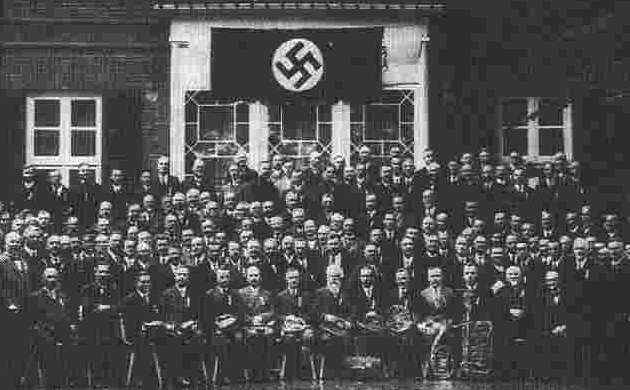
|
| September 1933: German Protestant deacons meet in
Hamburg to celebrate the centennial of their association. A
Protestant pastor addresses his comrades in a speech entitled
Deaconry as attack: "All this is Protestant deaconry: Service and
fight. We greet you all as the SA of Jesus Christ and the SS of the
Church, you brave ... [fighters] of need, misery, despair and
dereliction." [KS57] After the war the swastika was removed from
most of the photographs of the meeting. Only a few survived
unaltered, such as this one. |
Kittel and a group of twelve leading
theologians and pastors issued a proclamation that Nazism is "a call of God,"
and they thanked God for Adolf Hitler. Kittel was a party member and he himself
proudly claimed that he was a good Nazi. He explains that he did not join it as a
result of pressure or for pragmatic reasons but because he concluded that the
Nazi phenomenon was "a völkisch renewal movement on a Christian, moral
foundation." He accorded Christianity a place of honor in Nazi Germany precisely
because of its position on the Jewish Question. He said he was speaking for
other theologians too when he maintained that agreement with state and
Führer was obedience to the law of God.
These theologians were drenched in
anti-Semitism. For example, throughout the whole of the Nazi era, Kittel's
writings, Erickson has determined, "correspond to and support Nazi politics,
including all of the policies on the Jewish question, with the possible
exception of genocide," but one is led to wonder. He never spoke out against
extermination. Indeed, he actually propounded what was purported to be a
theologically solid Christian justification for the oppression of the Jews, whom
he referred to as "refuse."
Let me quote what a well know German
Protestant Pastor at the time had to say about Hitler's regime "We again feel
ourselves created beings. Profession and Social standing, race and nationality
are today again being regarded by us as important facts!" . . . He goes on
to tell his congregation about the "divine call in the (Hitler's) spiritual
revolution which is beginning to take place throughout the whole of our nation"
- (Pastor Neimoeller, The First Commandment, Pg. 58-59).
During the Nazi regime, the Protestant
Church in general supported Hitler. The Protestant clergymen who wound up as
inmates at Dachau were those who were anti-Nazi, such as the Reverend Martin
Niemöeller, one of the founders of the Confessional Church. Other Protestant
ministers who were incarcerated in the Dachau concentration camp were Ernst Wilm
and Kurt Scharf. Although there were far fewer Protestants who were persecuted
by the Nazis than there were Catholics and Jews, Germany's Protestant Church has admitted
using slave labour during World War II, and has pledged to pay compensation to
Nazi victims. The admission came after revelations that Berlin church parishes
set up a forced labour camp during the war, and used workers from mainly central
and eastern Europe for tasks such as grave-digging. "This was complicity in a
regime based on force and removed from the rule of law. We accept this guilt,"
said church council president Manfred Kock.
Again Peter F. Wiener in these regard confirms for us that that "After the
Nazis came to Power, the Lutherans supported Hitler. To them the as ordained by
Luther was infinitely more important than the Church or Christianity". Again he
tells us "When the people asked why the German people have never shown any sign
of revolt against Hitler and his gang, I have usually referred my questioners to
Luther, who was the first to say that even against the most unjust ruler the
people have never a right to revolt." (Ibid, Pg. 87-88).
|
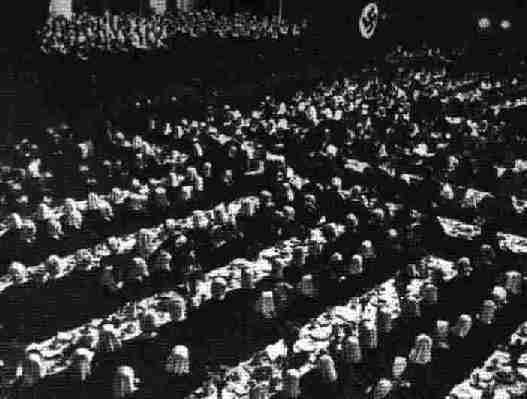
|
| November 15, 1933: More than a thousand Lutheran
nuns, meet under the swastika. The Bishop of Berlin in his speech:
"Permit me to compare our sisters with the SA!" (a paramilitary Nazi
troop). (Though it may be coincidental, even the layout of this
meeting, at least on this photograph, seems to resemble a huge
swastika. |
The church and its social services arm,
the Diakonisches Werk, said it would pay 10 million marks ($4.9m) into a fund
for surviving victims around the world recently set up by the German Government
and leading businesses. Along with the Roman Catholic Church, the Evangelical
Church is one of the two main denominations in Germany. Both were subject to
serious oppression during the Nazi regime. The peak of the forced labour scheme
came during the latter years of the war, as thousands of civilians mainly from
occupied eastern Europe were forcibly transported to Germany to boost the
flagging war effort. Most were housed in extremely poor conditions in labour
camps and made to work long hours in munitions factories.
All This Lutheran hatred for the Jews should not be
shocking for did not Luther preach this same hatred? Did not on February 15,
1996 [the 450th anniversary of the death of Martin Luther - the father of the
Reformation] The Evangelical Lutheran Church in Canada publicly denounced Martin
Luther's many "anti-Judaic diatribes" at its biennial national conference in
Winnipeg. Prior to that, Lutheran churches in the United States and elsewhere
had issued similar declarations.
Title Page of a German "German Deacon Press
MAGAZINE FOR MALE DEACONRY Official Organ of the German Deacons" April 1939
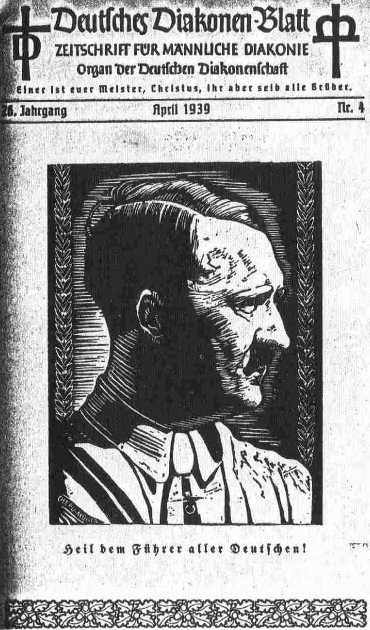
Please note that when this magazine was printed, the majority of the Nazis'
crimes had already been committed. Communists, democrats, homosexuals, and
others had already been carried off into concentration camps, the shameful
anti-Jewish race laws of Nuremberg had been introduced 1935. Even those who for
a long time had been closing their eyes to the evilness of the Nazis could no
longer delude themselves, after the "Kristallnacht" of November 1938, a
government-incited public pogrom against the remaining Jews when thousands were
killed in the streets, had taken place. The German army had "peacefully" (and to
the relief of the major part of its population) annexed Austria in early 1938,
and - less peacefully - invaded Czechoslovakia in March 1939.
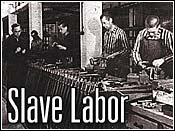
Among
the latest institutions to pledge support was Germany's Evangelical Church,
which promised $5 million last week as it acknowledged that Protestant churches
used forced laborers during the Nazi era for such jobs as grave-digging." [CBS
News, July 17, 2000]
Let me conclude by quoting for the last time Mr. Peter F. Wiener "Throughout
the Last war (WWI) and throughout the present one (WWII), the Germans have
committed atrocities which are impossible to imagine by those who have merely
read or heard about them. This is teaching hatred, but an undeniable though most
unplasant fact. Not once in either war has any section of the Lutheran clergy
protested -- such as have the churches of Norway and other occpied counties
where the Gestapo is at least as strong as inside Germany. With the exception of
a few refugee pastors in Britain, I do not know of any section of the German
Protestant Confessional Church whose pastors have refused to preach, to serve,
to ordain and bless the atrocities and horrors committed by the German armies
and their leaders. These facts are unpleasant and horrible. I maintain that we
can understand them and explain them only if we look at the dark figure from
whom the German Lutheran clergy has for four centuries taken their orders:
Martin Luther" (Ibid, Pg. 98-99).
Footnotes:
1. The Archbishop's, Conference, Malvern, 1941, London, 1941, Pg. 13.
2. Peter F. Weiner, Martin Luther, Hitler's Spiritual Ancestor, Published by
Marian House, Powers Lake, N.D. 58773. This book explains at greater length the
fact that Hitler's ideas were only a logical conclusion of the teachings of
Luther. Mr. Peter F. Weiner, is also the author of : German for the Scientist,
and German with Tears.
 This
map shows the influence of religious conviction on the Nazi vote for the
Reichstag election 7/32. Elevation represents the share of Catholics /
protestants (the higher, the more Catholics live in a Kreis) in relation to
total population. The Nazi vote share is represented by different color
shadings (dark red: highest NSDAP share; light green: lowest NSDAP share). The
map reveals that the NSDAP strongholds are clearly restricted to protestant
areas. This becomes very clear e.g. in East Prussia, where in a small catholic
enclave the NSDAP performed very poorly in comparison to the surrounding Kreise
dominated by protestants.
This
map shows the influence of religious conviction on the Nazi vote for the
Reichstag election 7/32. Elevation represents the share of Catholics /
protestants (the higher, the more Catholics live in a Kreis) in relation to
total population. The Nazi vote share is represented by different color
shadings (dark red: highest NSDAP share; light green: lowest NSDAP share). The
map reveals that the NSDAP strongholds are clearly restricted to protestant
areas. This becomes very clear e.g. in East Prussia, where in a small catholic
enclave the NSDAP performed very poorly in comparison to the surrounding Kreise
dominated by protestants. 


